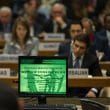Biosecurity solutions beyond the BWC
By Ralf Trapp, July 2, 2008
I agree with the other panelists that an international institution is needed to manage biorisks. The current mechanism under the Biological and Toxin Weapons Convention (BWC), which combines a work program with annual meetings of the States Parties, at expert as well as diplomatic levels, and which is supported by a small Implementation Support Unit (ISU) set up in 2007 at the U.N. Secretariat, cannot provide the necessary institutional structure to seriously address these risks at the international level.
Some in the U.S. will disagree. As Alan Pearson rightly observes, the segment of the U.S. foreign policy community that aims to prevent the use of the life sciences for hostile purposes views multilateral institutions as passé and instead sees the solution to the problem of biorisks in global networks. But such networks are temporary and aim at specific, often short-term objectives. They are useful when new issues emerge and the international community needs to react swiftly–in that context they can be effective and flexible. But they do not ensure the sustainable, long-term, and broad engagement of the international community.
The benefits of institutionalization can be seen in the efforts to improve national implementation of the BWC and the Chemical Weapons Convention (CWC). These efforts ensure the disarmament and nonproliferation objectives of both treaties and complement the requirements of Security Council Resolution 1540 to prevent proliferation of weapons of mass destruction and related materials to non-state actors.
In the case of the CWC, this has taken the form of an Action Plan of the Organization for the Prohibition of Chemical Weapons (OPCW). In the case of the BWC, national implementation is on the agenda of the intersessional process, and States Parties have reported on their status, as well as plans to enhance national implementation. The European Union, the United States, and other states have offered to help other countries develop national implementing legislation.
But there is a fundamental difference between the two processes: with the CWC, an international agency ensures consistency through common criteria and has developed the capacity to implement a sustainable assistance program to help States Parties improve their national implementation systems. The OPCW Secretariat regularly reports on the status of each State Party's national implementation. The political organs of the OPCW monitor progress and encourage states that are lagging behind to take additional action. As a consequence, assistance, both from the OPCW Secretariat and on a bilateral basis, is both sought-for and forthcoming. No comparable institutional processes exist with the BWC, and requests for assistance remain sporadic. Coordination between assistance providers is difficult, and there is little follow-up after assistance missions. The lack of institutional structure hampers efforts to improve national implementation of the BWC.
Perhaps the BWC needs a new model, as it has proved difficult to set up an international control regime based on regular declarations and inspections. It is also unrealistic to extend the scope of the routine verification system of the CWC further into the area of biotechnology, beyond the terms of the CWC's regime for other chemical production facilities. Additionally, routine verification in the field of biology would be technically difficult and ill-suited to address proliferation concerns related to non-state actors. It would require the support of bioindustries and the backing of states around the globe. I fear that there is not enough global support for a routine verification mechanism under the BWC, and that current verification concepts don't fully address the proliferation concerns emanating from advances in the life sciences.
I agree with Jonathan Tucker that the current range of international and nongovernmental initiatives will not fill the institutional deficit at the heart of the biological disarmament regime. The world needs an international agency that provides structure and institutional support for the implementation of the BWC. In my view, this agency should build on the current mandate of the ISU (which includes administrative support for BWC States Parties, universalization of the BWC, national implementation, and the implementation of confidence-building measures), and also include a mechanism to investigate allegations of breaches of the treaty. A new administration in Washington may offer an opportunity to revitalize efforts to set up such an international organization. It would be important to involve from the outset not only policy makers and security experts but also other stakeholders, including scientists and the industrial community, when defining realistic mandates and setting up effective institutional mechanisms.
Topics: Biosecurity
Share: [addthis tool="addthis_inline_share_toolbox"]














